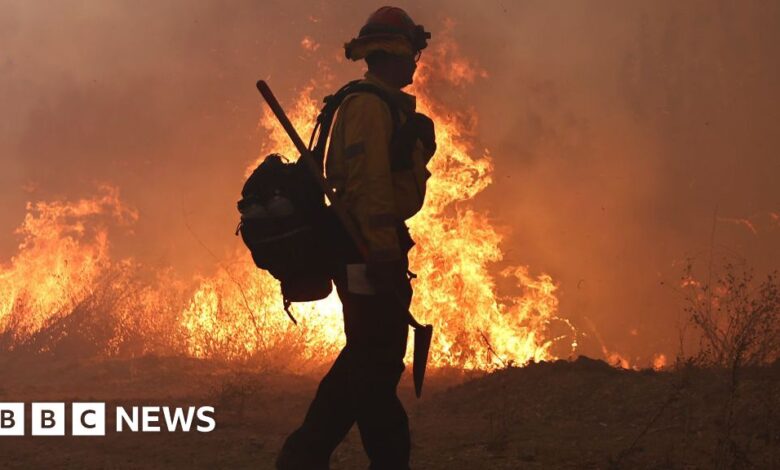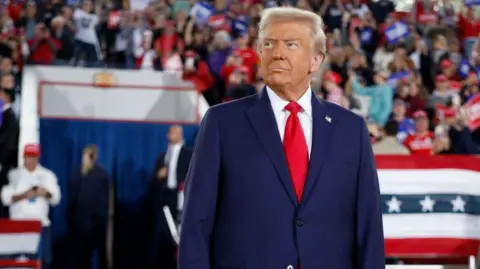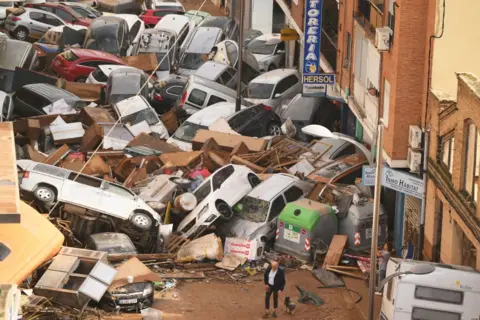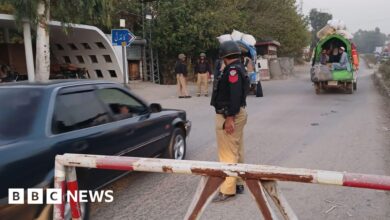US special envoy vows climate war will continue under Trump

 Getty
GettyThe US special envoy said at the COP29 conference on the opening day that the US will continue to fight climate change and limit emissions of planet-warming gases despite the election of Donald Trump.
Biden administration appointee John Podesta has labeled the incoming president a climate denier who would dismantle environmental protections and exclude the US from a key international agreement to stop burning fossil fuels.
Experts say Trump’s return to the White House will have an extremely negative impact on climate change action, at least in the short term.
But Podesta said “facts are facts, science is science” and that US states and cities will continue the fight to reduce fossil fuel use.
“In January, we will inaugurate a president whose relationship to climate change is summed up by the words ‘hoax’ and ‘fossil fuels,'” Mr. Podesta said.
“He has vowed to dismantle our environmental protections and again withdraw the United States from the Paris Agreement.”
“That’s what he said, and we should believe him.”
The 2015 Paris Agreement saw countries agree to try to keep global temperature rise below 1.5 degrees Celsius.
Leaders from nearly 100 countries will speak at the meeting in the coming days.
COP29 is seen as an opportunity to tackle the important issue of providing money to poorer countries to help them tackle the impacts of climate change and help them prepare for it.
But expectations about what the summit could achieve were lowered by Trump’s victory, which took Biden administration negotiators from one of the world’s biggest carbon emitters to a lame duck in this process and can’t really promise much.
However, the election is not the end of the struggle, Podesta told reporters.
He believes that thanks to policies put in place by President Biden and with support from states and cities, US emissions will continue their downward trajectory, albeit at a slower pace.
“The fight is bigger than an election, a political cycle and a country. This fight is even bigger because we are living through a year that is defined by the climate crisis in every country in the world.”
COP29 is conducted against a backdrop of scientific gloom. The United Nations’ World Meteorological Organization (WMO) said in a report published to coincide with the opening of the conference that 2024 could become the world’s warmest year on record.
The organisation’s latest State of the Climate report also shows that our oceans are warming rapidly and ice loss is accelerating.
“We are on the road to destruction,” said Mukhtar Babyaev, president of COP29, in his opening speech.
He went on to list examples of current climate impacts around the world, saying that “these are not future problems” as rising temperatures are already causing enormous damage. worldwide.
 Getty Images
Getty ImagesThe mood of the delegates was not improved by the scale of the main task facing negotiators here.
Amid the economic and energy crisis, developed countries are expected to find billions more in climate finance for developing countries.
Richer countries are willing to increase their contributions, as long as major emerging economies such as China and the Gulf states also participate.
UN climate change chief Simon Stiell said two-thirds of the world cannot afford to cut emissions fast enough to maintain the 1.5C threshold.
If they don’t have the money to cut carbon, he said, everyone suffers.
“Discard any idea that climate finance is charity. He told delegates that an ambitious new climate finance target was absolutely in the interests of every country, including the largest and wealthiest.
One issue that was on the minds and wallets of those attending this gathering was the cost of food and drinks at the convention center.
Our colleague Aygul Mehman, a journalist with the BBC’s Azerbaijan service, was charged 41 AZN (Azerbaijani’s currency) for a modest lunch of soup, bean salad and dry bread. That’s about £18 ($24).
“It looks like they’re taking money out of our pockets,” one delegate told BBC Climate Editor Justin Rowlatt as he was queuing for food.
This is a serious problem. Delegates from poorer countries often complain about how much these big conferences cost them when flights and hotels are added in and the total can run into thousands of pounds.





